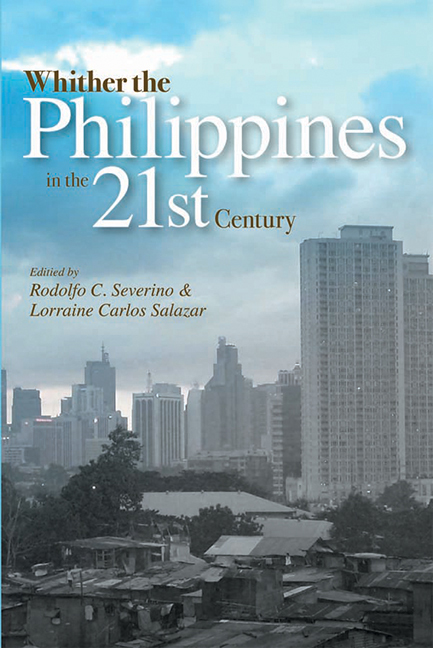Book contents
- Frontmatter
- Contents
- List of Illustrations
- Foreword
- Acknowledgements
- The Contributors
- List of Abbreviations
- Map of Southeast Asia
- 1 The Philippines in Southeast Asia
- 2 From Regime Crisis to System Change
- 3 Proposed Constitutional Reforms for Good Governance and Nation Building
- 4 The Military in Philippine Politics
- 5 Religion and Politics
- 6 The Philippine Press
- 7 Macroeconomic Issues and Challenges
- 8 Investment Climate and Business Opportunities
- 9 Why Does Poverty Persist in the Philippines?
- 10 Diaspora, Remittances, and Poverty
- 11 The Philippine Development Record
- 12 Sancho Panza in Buliok Complex
- 13 The Insurgency That Would Not Go Away
- 14 Whither the Philippines in the 21st Century?
- Index
6 - The Philippine Press
Published online by Cambridge University Press: 21 October 2015
- Frontmatter
- Contents
- List of Illustrations
- Foreword
- Acknowledgements
- The Contributors
- List of Abbreviations
- Map of Southeast Asia
- 1 The Philippines in Southeast Asia
- 2 From Regime Crisis to System Change
- 3 Proposed Constitutional Reforms for Good Governance and Nation Building
- 4 The Military in Philippine Politics
- 5 Religion and Politics
- 6 The Philippine Press
- 7 Macroeconomic Issues and Challenges
- 8 Investment Climate and Business Opportunities
- 9 Why Does Poverty Persist in the Philippines?
- 10 Diaspora, Remittances, and Poverty
- 11 The Philippine Development Record
- 12 Sancho Panza in Buliok Complex
- 13 The Insurgency That Would Not Go Away
- 14 Whither the Philippines in the 21st Century?
- Index
Summary
INTRODUCTION
The inclusion of the press in this book may help to better understand some aspects of the political crisis in the Philippines. Basically, it is a crisis of governance, resulting from flawed and failed leadership. The questions of legitimacy and credibility hound the Arroyo administration with consequent loss of public confidence and trust. In this situation, the press has played a role.
The press is a political institution, providing for the public exchange of ideas as well as disseminating news about issues, developments and events. How well or how poorly the press performs these tasks affects the public's ability to understand public affairs and to be engaged in the pursuit of solutions. The press is, therefore, as much part of the problem as, hopefully, it is part of the solution.
Whatever the form of government, the press is always involved in governance and public affairs. In controlled political systems, the press serves as a handmaid of government, a vehicle to transmit official information or propaganda. Such a press assists government to achieve what it sets out to do. It is expected to accept editorial guidance from government so that it can aid and facilitate public acceptance of policy decisions and official programmes.
In political systems based on greater freedom and autonomy, the press plays a different kind of role. The press defines and performs its duty as it sees fit. With varying degrees of independence from owners, the press operates as a private sector endeavour or enterprise. The libertarian model prescribes this freedom from government interference on the premise that the press will uphold public, rather than partisan, interests. To fulfil this mandate, the press must also exercise social responsibility and possess competence and integrity. With these values, the journalists are supposed to provide news and commentary that are truthful and relevant, so as to enable public debate. Because it reports on public affairs and public figures, the press acts as the “watchdog” of those in power. This places it in an adversarial relationship with government.
- Type
- Chapter
- Information
- Whither the Philippines in the 21st Century? , pp. 127 - 141Publisher: ISEAS–Yusof Ishak InstitutePrint publication year: 2007



